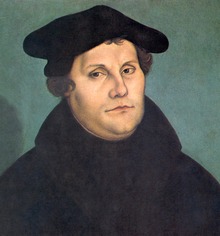Change is hard in any period and time. It means a different thing to each person. Many societies resist change because of the unknown tomorrow; many see it as a glimpse of light in the darkness of their lives, while many others see it as a threat to the stability of the only world they know, and others fear to lose the power they hold. History has taught us that scores of leaders stood in the way of change, and did all they could to prevent anyone or any idea from shaking the thrones they once thought could never be moved. This still exists today as we are witnessing the outcome of the so-called Arab Spring.
German monk Martin Luther was one of the pioneers in challenging the system. He was an activist of his time, who fought with all his might armed with his sharp unbending pencil. His story is a great example of how the idea of change had been received in the middle ages, and how  that has not changed much even after many centuries have passed. He wrote 95 Theses in which he attacked the Catholic Church, the most powerful authority of the day, in a way it had never before encountered. His insolence and effrontery caused the pope’s fury. The latter decided to excommunicate Luther. However the idea was spreading like wildfire and there was no way to contain the damages.
that has not changed much even after many centuries have passed. He wrote 95 Theses in which he attacked the Catholic Church, the most powerful authority of the day, in a way it had never before encountered. His insolence and effrontery caused the pope’s fury. The latter decided to excommunicate Luther. However the idea was spreading like wildfire and there was no way to contain the damages.
Although Luther’s idea of reforming the Catholic Church goes back to the 16th century, its very essence makes him a “whistle-blower” of his era, an activist and a strong opposition leader that cannot be silenced despite potential consequences. Some scholars in the documentary The Reluctant Revolutionary said Luther was calling for the democratization of religion. And yet, if there had been no printing press at the time, Luther’s ideas would not have traveled throughout Europe and made him the most popular man in the continent in merely a month. Without people’s interest, the printing, and distribution of his writings, his pamphlet and later on his translated bible, none of his goals would have been achieved.
After exposing the Church, he refused to reject what he had written against Rome’s un-Catholic practices, and how it used to amass wealth at the expense of the faithful and the religion he had committed his life to serve. He said after a meeting where his fate was being decided, “here I stand and I can do no other”. This statement of his, one of the scholars featured in the documentary said, “launched a new era where the ordinary man can defy authority. Or as Professor Klein said, “it launched the liberty of conscience”.
But Luther is not the leader of change we might think of today. Even if he was the head of the revolution at the heart of the Catholic Church, he refused the effect his ideas had on peasants and common people who were aspiring to get more out of this moment. Not only did he stand in the way of the social demands of the grassroots, but he wrote a prose to counter their calls and incited for their brutal killing. His writing this time inspired those in power to order the carnage. According to the documentary, 100K of the rebelling people were killed. Today we still see how some governments’ respond to social justice demands of the people.The unfortunate and yet best example is Syria. It is living an ongoing brutal civil war, with tens of thousands killed and millions displaced, at the mercy of government forces or terrorist who have found a safe haven amid the chaos.
Luther might have been the first known propagandist, as one expert mentioned in the film, a man who looked the Catholic Church in the eye and said all that was wrong with it, a man who brought Protestantism to light; however he was also a man who believed in a divided society that denies the basic human needs of the less fortunate, and had no religious tolerance towards those who did not share his faith, primarily Jews.
Picture source.

Leave a response